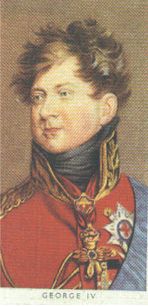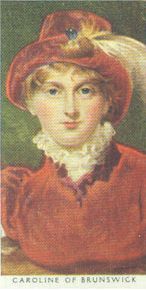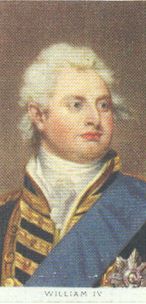Our Territories
Channel Islands
England
Ireland
Isle of Man
Scotland
Wales
Our Categories
Home | Set 1 | Set 2 | Set 3 | Set 4 | Set 5 | Set 6 | Set 7 | Set 8 | Set 9 | Set 10
 |
Charlotte of
Mecklenburg-Strelitz Charlotte, who married George III in 1761, took no part in state affairs and was without political influence. Throughout their long reign she and the king set a high standard of domesticity, which, with the coloulessness, decorum and economies of their Court, contrasted sharply with the world of fashion, which they did not enter. Her harshness towards her sons in youth may have provoked their later excesses, which gave her much pain. The etiquette of her Court nearly broke the spirits of Fanny Burney, the lively author of Evelina who was in attendance on her for five years. |
 |
George IV George IV, the son of George III, acted as Regent from 1811-20. A harsh upbringing resulted in dissoluteness and extravagance which lasted all his life. He married in 1785 Mrs. Fitzherbert (whom he was compelled to repudiate_ and in 1795 Caroline of Brunswick. Actuated largely by opposition to his father, he was a hindrance rather than a help in public affairs, and was dangerously unpopular, derided by the press and embarrassing to his ministers. But he was brilliantly gifted, cultivated, gracious, a noble patron of art and letters, and in person was the most distinguished monarch since Charles I. |
 |
Caroline of
Brunswick In 1795 Caroline was married to her cousin, later George IV. Soon after the birth of her only child, Charlotte, early in 1796, a formal separation took place, and for eighteen years she lived in unwilling retirement. She traveled about Europe with a most unsuitable retinue, but on George's accession in 1820 she determined to return to England. A painful and undignified situation resulted in a bill for divorce which however was dropped. On the King's orders the doors were closed against her at the Coronation; popular sympathy was with her but the shock of her repulse brought illness from which she died. |
 |
William IV For ten years the young Prince William, brother of George IV served in the Navy afloat. In 1789 he was created Duke of Clarence and for the next forty years he lived the retired life of a country gentleman. In 1818 he married the Princess Adelaide of Saxe-Meiningen. The deaths of his elder brothers brought him, at sixty-five to the throne. As King he became popular, for he was known to favour reform, and though he was nick-named "Silly Billy," he was very far from stupid. |
 |
Adelaide of Saxe-Meiningen Adelaide was married in 1818 to the Duke of Clarence, afterwards William IV, and though the marriage was happy, the loss of her two children caused her deep sorrow. During the agitation over the Reform Bill she became very unpopular, which convinced her that revolution was imminent, and that she would share the fate of Marie-Antoinette. In her widowhood the hostility was forgotten, and her public and private charities won the Queen-Dowager high esteem; but anxiety had ruined her health and she spent most of her last years as an invalid. |
Home | Set 1 | Set 2 | Set 3 | Set 4 | Set 5 | Set 6 | Set 7 | Set 8 | Set 9 | Set 10